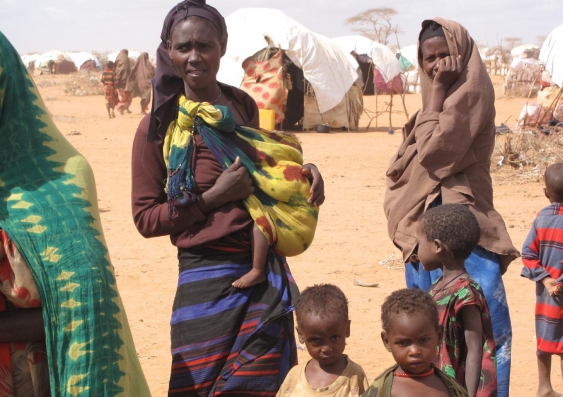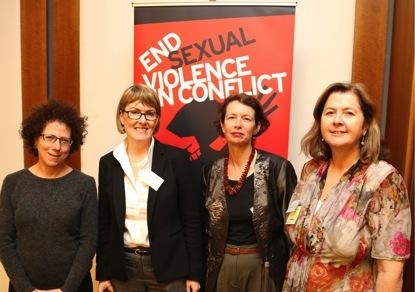Ending sexual violence in conflict zones
We cannot accept a world where women are considered the collateral damage of war, Foreign Minister Julie Bishop has told a symposium attended by UNSW experts.
We cannot accept a world where women are considered the collateral damage of war, Foreign Minister Julie Bishop has told a symposium attended by UNSW experts.

We cannot accept a world where women are considered the collateral damage of war, Foreign Minister Julie Bishop has told a symposium attended by UNSW experts.
The experts on the prevention of sexual violence in conflict zones took part in a high-level symposium hosted by Ms Bishop at Parliament House.
Professor Louise Chappell, Dr Jo Spangaro and Dr Linda Bartolomei from UNSW Arts and Social Sciences and Professor Andrea Durbach from UNSW Law were invited to attend the Australian Dialogue on Preventing Sexual Violence in Conflict co-hosted by the British High Commissioner in Australia, Paul Madden.
In her opening address Ms Bishop reinforced the need to build capacity in all sectors to recognise crimes involving sexual violence.
“We cannot accept a world where women are considered collateral damage of war. We have to work together – this is a matter for the good minds in all sectors – legal, military, government, policing, humanitarian, diplomatic, judicial and NGOs. We need frontline services so women can rebuild their lives and communities,” she said.
The objective of the Dialogue was to receive expert academic and civil society input into the action document to be presented by Australia’s Ambassador for Women and Girls, Natasha Stott Despoja, at the Global Summit to End Sexual Violence in Conflict in London next week.
The Summit, co-chaired by Special Envoy for the UN High Commissioner for Refugees Angelina Jolie and UK Foreign Secretary William Hague aims to “create irreversible momentum” against sexual violence in conflict and is the largest international gathering to discuss the issue.
At the Australian symposium Professor Chappell presented her research into the International Criminal Court’s capacity to strengthen accountability and access to justice for survivors of conflict-related sexual violence.
“There is more the Australian government can do to encourage the ratification of the International Criminal Court’s statute in the Asia Pacific region," Professor Chappell said. “This would aid in strengthening legal processes for victims of sexual violence crimes and help end impunity for the perpetrators of these crimes.”
Dr Spangaro presented on safe responses to victims of sexual violence in conflict situations, including prevention and deployment of personnel and troops, based on a systematic review she completed with colleagues at UNSW, funded by AusAID.
“Impunity travels,” Dr Spangaro told participants. “We need to ensure we first do no harm by deploying safe personnel and humanitarian staff, because reporting sexual violence will always be fraught for many victims in these settings.”
Dr Bartolomei, Director of UNSW’s Centre for Refugee Research, contributed to a major project in 2011, Survivors, Defenders, Providers, exposing widespread sexual violence in international refugee camps which resulted in a commitment from the UNHCR to address the issue.
Professor Durbach is the director of UNSW’s Australian Human Rights Centre (AHRCentre) and was part-time Deputy Sex Discrimination Commissioner at the Australian Human Rights Commission from 2011-2012.
Two graduates of UNSW’s Master in Development Studies, Carole Shaw and Sarah Shteir, also presented at the Dialogue.
A symposium Responses to Sexual Violence in Conflict, co-sponsored by UNSW’s Gender Based Violence Research Network and the AHRCentre will be held this Friday 6 June. For more information contact Paula Bennett, paula.bennett@unsw.edu.au
Media contact: Fran Strachan, UNSW Media Office, 9385 8732, 0429 416 070

(L-R) Professors Andrea Durbach and Louise Chappell, and Drs Jo Spangaro and Linda Bartolomei